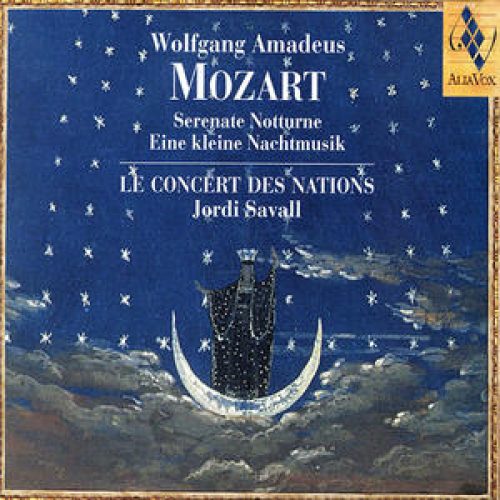BBc music magazine : George Hall
Performance : *****
Sound : ****
Four of Mozart’s lighter works, three of them very familiar, played by a period-instrument ensemble of aptly-scaled size. Savall sets some brisk tempos, particularly for the slow movement of Eine kleine Nachtmusik, but they’re convincing. The soloists in the Serenata notturna are lively – the double bass and timpani are even granted cadenzas in the finale. But it’s vivid playing from everyone, well defined in outline and responding imaginatively to the varied character of Mozart’s music. The sound is spacious, if a little over resonant, and the multiple groups employed in two of the pieces – the Serenata notturna has a small concertino responding to the main ensemble, while the less well known Notturno is scored for four small orchestras – are nicely separated. The three-fold echo effects in the latter are especially well handled. Mozart’s Musical Joke perhaps needs greater pointing up of its comic touches. With its platitudinous style, wrong notes and sheer general clumsiness, it’s presumably his wry comment.
musicweb : Terry Barfoot
No composer has written ”entertainment music” of such lasting quality as Mozart. Compositions that may or may not have been intended to be listened to by an audience have secured lasting repertory positions, despite their unpromising provenance of entertaining the aristocracy at dinner or at play.
The best known piece among this collection is of course the string serenade known as Eine kleine Nachtmusik, composed for an unknown occasion in Vienna during 1787. Savall’s performance stands up well, with expertly phrased balancing of the subtle part-writing, and a real freshness in the interpretation of what can too easily seem hackneyed music. The ”authentic” string sound is pleasing too, as it is throughout the whole programme.
In the Serenata Notturna, a Salzburg composition from ten years previously, the addition of a timpani part makes a telling difference to the music. It is well handled but the over-resonant acoustic encourages the view that there is a want of precision in the ensemble. This is a problem in all the other music too, and it is difficult to know whether the venue or the engineers are too blame. In the Serenata the music is far from unsatisfactory in its impact, particularly in the engagingly rhythmic finale, when the subtle counterpoints of the violas really make their mark.
The beautifully contrived three-movement Notturno, one of Mozart’s most engaging Salzburg compositions, is arguably the best of all among this collection. The gentle pacing of the first movement allows the personality of each melodic ingredient to make its point. All credit to Savall for phrasing the music with care and attention to detail, and perhaps for taking due account of the resonant acoustic as well.
The Musical Joke is a vibrant and at times compelling piece, and the prominence given to the enthusiastically dissonant horns makes this a particularly compelling experience, at once jarring on the ear and engaging on the mind. Again the spacious and reverberant acoustic adds a special dimension to the effect, and some listeners will be more tolerant of this than others. The same basic issue, in fact, will apply to the whole disc.
Tracks
01. Serenade in D, Serenata Notturna, K. 239 Marcia (Maestoso)
02. Serenade in D, Serenata Notturna, K. 239 Menuetto – Trio
03. Serenade in D, Serenata Notturna, K. 239 Rondeau (Allegretto – Adagio – Allegro)
04. Serenade in G, Eine Kleine Nachtmusik, K. 525 Allegro
05. Serenade in G, Eine Kleine Nachtmusik, K. 525 Romance (Andante)
06. Serenade in G, Eine Kleine Nachtmusik, K. 525 Menuetto (Allegretto) – Trio
07. Serenade in G, Eine Kleine Nachtmusik, K. 525 Rondo (Allegro)
08. Notturno in D Für Vier Orchester, K. 286 Andante
09. Notturno in D Für Vier Orchester, K. 286 Allegretto Grazioso
10. Notturno in D Für Vier Orchester, K. 286 Menuetto – Trio
11. Ein Musikalicher Spa?, K. 522 Allegro
12. Ein Musikalicher Spa?, K. 522 Menuetto (Maestoso) – Trio
13. Ein Musikalicher Spa?, K. 522 Adagio Cantabile
14. Ein Musikalicher Spa?, K. 522 Presto


